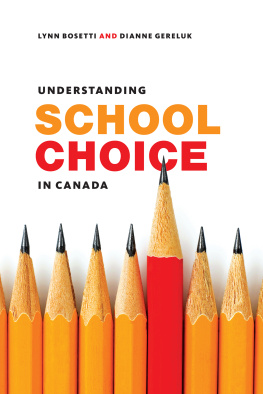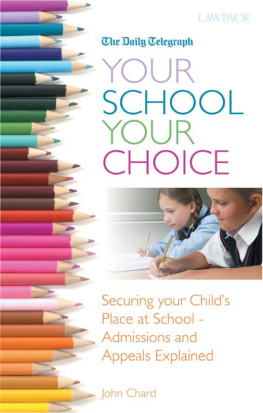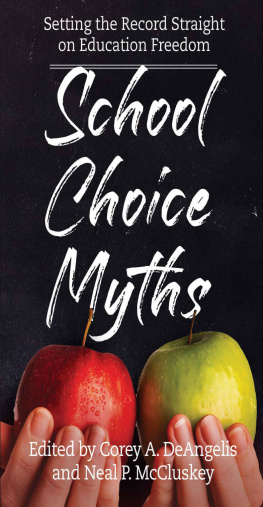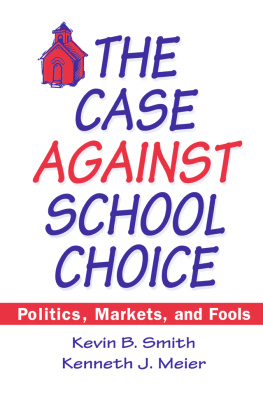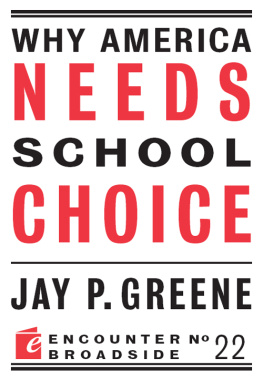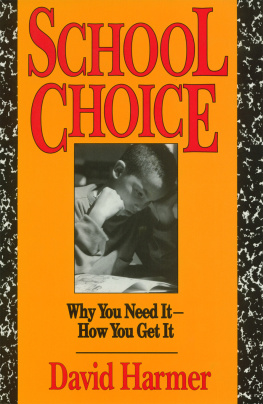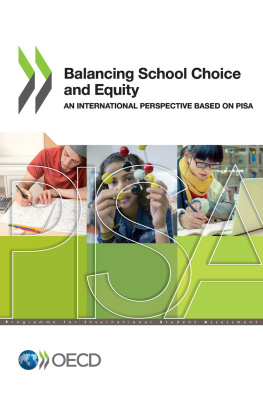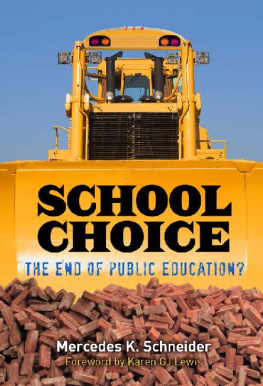Lynn Bosetti - Understanding School Choice in Canada
Here you can read online Lynn Bosetti - Understanding School Choice in Canada full text of the book (entire story) in english for free. Download pdf and epub, get meaning, cover and reviews about this ebook. year: 2016, publisher: University of Toronto Press, genre: Politics. Description of the work, (preface) as well as reviews are available. Best literature library LitArk.com created for fans of good reading and offers a wide selection of genres:
Romance novel
Science fiction
Adventure
Detective
Science
History
Home and family
Prose
Art
Politics
Computer
Non-fiction
Religion
Business
Children
Humor
Choose a favorite category and find really read worthwhile books. Enjoy immersion in the world of imagination, feel the emotions of the characters or learn something new for yourself, make an fascinating discovery.
- Book:Understanding School Choice in Canada
- Author:
- Publisher:University of Toronto Press
- Genre:
- Year:2016
- Rating:4 / 5
- Favourites:Add to favourites
- Your mark:
- 80
- 1
- 2
- 3
- 4
- 5
Understanding School Choice in Canada: summary, description and annotation
We offer to read an annotation, description, summary or preface (depends on what the author of the book "Understanding School Choice in Canada" wrote himself). If you haven't found the necessary information about the book — write in the comments, we will try to find it.
Understanding School Choice in Canada provides a nuanced and theoretical overview of the formation and rise of school choice policies in Canada.
Understanding School Choice in Canada — read online for free the complete book (whole text) full work
Below is the text of the book, divided by pages. System saving the place of the last page read, allows you to conveniently read the book "Understanding School Choice in Canada" online for free, without having to search again every time where you left off. Put a bookmark, and you can go to the page where you finished reading at any time.
Font size:
Interval:
Bookmark:
LYNN BOSETTI and DIANNE GERELUK
UNIVERSITY OF TORONTO PRESS
Toronto Buffalo London
University of Toronto Press 2016
Toronto Buffalo London
www.utppublishing.com
Printed in the U.S.A.
ISBN 978-1-4426-4308-6

Printed on acid-free, 100% post-consumer recycled paper with vegetable-based inks
Library and Archives Canada Cataloguing in Publication
Bosetti, Lynn, 1959, author
Understanding school choice in Canada /Lynn Bosetti and Dianne Gereluk.
Includes bibliographical references and index.
ISBN 978-1-4426-4308-6 (cloth)
1. School choice Canada. I. Gereluk, Dianne, author II. Title.
LB1027.9.B68 2016 379.1'110971 C2016-900799-5
University of Toronto Press acknowledges the financial assistance to its publishing program of the Canada Council for the Arts and the Ontario Arts Council, an agency of the Government of Ontario.

We are grateful for the significant contributions of many individuals who openly shared their vision, underpinning values, and perspectives on schooling. For more than 20 years we have talked with educators, administrators, superintendents, and government officials about the nature of school choice in alternative public schools, charter schools, and independent schools. Their willingness to articulate the ideals, barriers, and opportunities associated with school choice continues to remind us of the complexity of providing such educational alternatives.
We also want to thank the University of Toronto Press editorial board for their ongoing support and the constructive feedback we received from our blind reviewers. Their insightful recommendations pushed us to examine the nuances related to school choice policies in Canada. In the final revisions, we are particularly thankful to David Scott for his excellent editorial guidance. His subject matter expertise concerning the pluralist nature of Canada was particularly evident in his authored contributions to Chapter 2.
Finally, we want to thank our families for their support through this writing journey. While our growth as authors has been challenging and worthwhile, we recognize its cost in terms of quality time spent with our families. We thank you for your love and support.
WRITTEN WITH DAVID SCOTT
In memory of my father, Dr. Reno Bosetti, who was vigilant in his support for public education.
Lynn Bosetti
To my mother, Eileen Makowecki, who continues to inspire me each and every single day.
Dianne Gereluk
School choice policies are prominently placed on most educational agendas in Western liberal democracies. The idea of choice is attractive. Its promise of equality, freedom, and democracy resonates with many political and social movements, and reflects the modern desire for autonomy, control, and self-expression (, p. 17). In its most basic form, school choice involves giving parents the right to choose approaches to education beyond those offered through the school assigned to their children based on their neighbourhood. It requires school boards to respond to diverse needs and perspectives on how children should be educated, rather than agreeing on a particular form of curricula or provision for schooling.
Debates around school choice policies are often taken up in opposition to, or alongside, traditional conceptions of public schooling historically based on the common school model, despite the fact that Canada has a long history of publically funded separate Catholic and Protestant school systems and federally funded schools for Aboriginal students. This compulsory model of education brought a diverse population together in state-funded schools in an attempt to forge a common schooling experience that would help students acquire the necessary skills and knowledge to participate in the labour market and become productive ).
Increasing levels of urbanization and immigration and a shift to a knowledge-based economy requiring more highly skilled workers have intensified pressure on schools to reform the common schooling model. Pressure to reform this system of education has also come from marginalized and minority groups, who have contested the dominant ideologies implicit in and perpetuated by the common school movement. Based on the principles of equity and social justice, these groups have sought accommodations for their culture, identity, values, and beliefs. In a similar vein, parents seeking more voice in the socialization and education of their children have looked for schools more in line with their family values, child-rearing practices, and aspirations for their children. These social, political, and economic factors have created the impetus for ministries of education and school boards throughout Canada to consider alternative schooling arrangements ().
Proponents of school choice reforms argue that traditional public schooling, such as neighbourhood-based school assignments, governance by district, and a one-size-fits-all model of education, neglects the needs of diverse communities and individual learners and provides little incentive for schools to innovate and improve. Advocates herald school choice as a mechanism to encourage public schools to adopt leading educational practices to foster innovation in curriculum, instruction, and governance, as well as to introduce educational provisions to address the learning needs and interests of a diverse range of communities. By breaking the link between residence and school assignment, market forces are invoked that create competition among schools because parents now vote with their feet (, p. 2), thereby creating incentives for schools to be more responsive to diverse parental interests and needs while also increasing student achievement outcomes. Advocates also argue school choice serves as a mechanism to promote greater equity and educational opportunity for all people and in particular for those students whose parents are unable to live in neighbourhoods with quality schools. Because neighbourhood schools can vary significantly in terms of quality and resources, advocates contend that school choice policies provide lower-income families with educational options they would not normally be able to access.
While proponents of school choice extol its virtues, opponents see the idea of educational markets as the commodification of education, which has traditionally been viewed as an essential public good and the great equalizer in terms of life chances for the most disadvantaged students. Critics raise concerns that school choice creates a multi-tiered public education system that perpetuates the segregation of students into increasingly unequal schools ( free market ideology should inform provisions for public education. Rather than creating an educational environment that pits school against school, where students inevitably compete with one another for admission to the best schools, opponents of school choice reform argue that policymakers should focus on ensuring that every neighbourhood has a quality school.
We see several limitations in how these school choice debates are often framed, both within the academic literature and within the greater public sphere. The first of these concerns the way normative assumptions regarding the aims and purposes of schooling are not always acknowledged by either detractors or advocates of school choice policies. , p. 17). While conceptual debates regarding the merits of school choice will likely remain contentious, the need exists for a deeper understanding of the underlying theoretical and philosophical principles, aims, and context for which particular school choice policies are designed.
Font size:
Interval:
Bookmark:
Similar books «Understanding School Choice in Canada»
Look at similar books to Understanding School Choice in Canada. We have selected literature similar in name and meaning in the hope of providing readers with more options to find new, interesting, not yet read works.
Discussion, reviews of the book Understanding School Choice in Canada and just readers' own opinions. Leave your comments, write what you think about the work, its meaning or the main characters. Specify what exactly you liked and what you didn't like, and why you think so.

